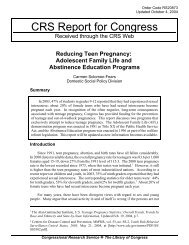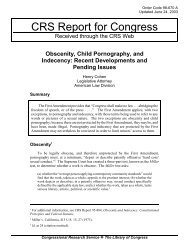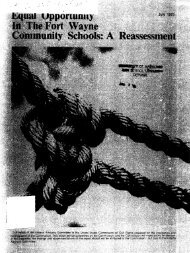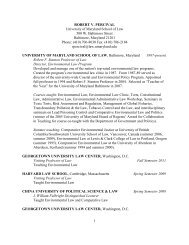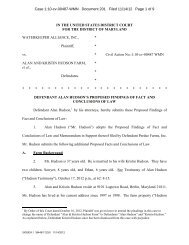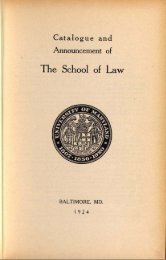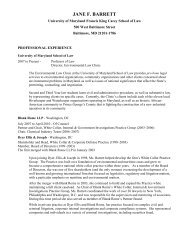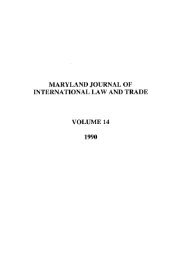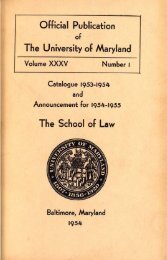University of Maryland School of Law : Catalog, 1988-1989
University of Maryland School of Law : Catalog, 1988-1989
University of Maryland School of Law : Catalog, 1988-1989
You also want an ePaper? Increase the reach of your titles
YUMPU automatically turns print PDFs into web optimized ePapers that Google loves.
Description <strong>of</strong> Required and<br />
Elective Courses<br />
This list includes only those<br />
courses which are being taught during<br />
<strong>1988</strong>-89 or which have been<br />
<strong>of</strong>fered since 1985-86. Several<br />
other courses have been approved<br />
by the Faculty Council. Most<br />
courses are <strong>of</strong>fered every year, but<br />
some—usually <strong>of</strong> a specialized<br />
nature—are <strong>of</strong>fered every two or<br />
three years, depending upon the<br />
interest <strong>of</strong> students and the interest<br />
and availability <strong>of</strong> faculty.<br />
The number <strong>of</strong> credit hours<br />
given for the satisfactory completion<br />
<strong>of</strong> a course is indicated in parentheses<br />
after the name <strong>of</strong> the<br />
course. The symbol * after a<br />
course name identifies a course requiring<br />
written work, on which the<br />
grade for the course will largely depend.<br />
The symbol + after a<br />
course identifies a subject tested<br />
on the <strong>Maryland</strong> Bar Exam, but<br />
not required by the school for<br />
graduation.<br />
At the end <strong>of</strong> a course description,<br />
the letter P indicates a prerequisite<br />
for the course described.<br />
C indicates a course which must be<br />
taken either before or concurrently<br />
with the course described. R indicates<br />
a course which is recommended<br />
as a prior or concurrent<br />
course, but is not required.<br />
Accounting (2)<br />
Accounting is a basic level course<br />
for students with little or no background<br />
in accounting and finance.<br />
68<br />
The first one-third <strong>of</strong> the semester<br />
will concentrate on an introduction<br />
to accounting principles and<br />
concepts, and basic double-entry<br />
accounting. The remainder <strong>of</strong> the<br />
semester will deal with a variety <strong>of</strong><br />
financial accounting topics important<br />
to a practicing lawyer including:<br />
the relevance and importance<br />
<strong>of</strong> generally accepted accounting<br />
principles (GAAP); the relationship<br />
<strong>of</strong> financial accounting to income<br />
tax accounting; the importance<br />
<strong>of</strong> proper realization and<br />
recognition <strong>of</strong> income; and how<br />
management decisions affect reported<br />
income. We will learn the<br />
basics <strong>of</strong> reading and interpreting<br />
financial statements by using published<br />
annual reports <strong>of</strong> several<br />
well-known corporations. Students<br />
with substantial prior course work<br />
or experience in accounting or finance<br />
may not take this course.<br />
Day (LAW 500 Q— Mr. Fishman.<br />
Administration <strong>of</strong> Criminal<br />
Justice Seminar* (3)<br />
This seminar explores the contours<br />
and problems <strong>of</strong> the justice delivery<br />
system from the perspective <strong>of</strong><br />
the legal pr<strong>of</strong>ession. The structure,<br />
organization and financing <strong>of</strong> criminal<br />
justice are considered as well<br />
as traditionally troublesome areas<br />
<strong>of</strong> criminal procedure: police evidence-gathering<br />
methods, use <strong>of</strong><br />
informants, interrogation techniques<br />
and search and seizure problems.<br />
Day (LAW 559 C)-Mr. Evans;<br />
Evening (LAW 559 H)—Judge<br />
Moylan and Ms. Hughes.<br />
Administrative <strong>Law</strong> (3)<br />
This course is concerned with the<br />
nature and function <strong>of</strong> administrative<br />
agencies; procedure before administrative<br />
tribunals, including<br />
notice, hearings and enforcement<br />
<strong>of</strong> rules and orders; and judicial<br />
control over administrative action.<br />
C: Constitutional <strong>Law</strong><br />
Day (LAW 501 C)—Ms. Strand,<br />
Mr. Tomlinson; Evening (LAW 501<br />
H)— Mr. Dash; Summer <strong>1988</strong>—Ms.<br />
Strand.<br />
Admiralty (2)<br />
Students study the law relating to<br />
maritime transactions and consider<br />
problems involving admiralty jurisdiction,<br />
maritime liens, rights <strong>of</strong><br />
seamen and other maritime workers,<br />
carriage <strong>of</strong> cargo, charter parties,<br />
salvage, general average, collision<br />
and limitation <strong>of</strong> liability.<br />
Day/Evening (LAW 502 H) at 5:25<br />
p.m.—Mr. Tobias.<br />
Alternative Methods <strong>of</strong> Dispute<br />
Resolution (3)<br />
This course will examine methods<br />
<strong>of</strong> dispute resolution, other than<br />
litigation, including negotiation,<br />
conciliation, mediation, fact-finding,<br />
minitrials, and arbitration. It<br />
will also explore the use <strong>of</strong> various<br />
hybrid procedures and other mechanisms<br />
specifically designed to<br />
meet the needs <strong>of</strong> a particular controversy<br />
or categories <strong>of</strong> controversies.<br />
Consideration will be given to<br />
use <strong>of</strong> these alternative mechanisms<br />
in the private sector, versus their<br />
use in court-annexed programs or



